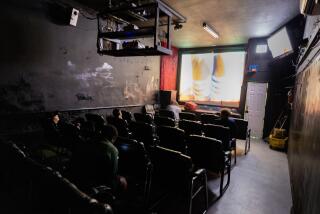Fruity drinks -- and even fruitier offerings
- Share via
IN HER famous essay “Notes on ‘Camp,’ ” Susan Sontag lists films she considered to be aligned with the schlocky sensibility she described as a “love of the unnatural: of artifice and exaggeration.”
Ernest Schoedsack’s 1933 “King Kong” and “The Maltese Falcon” were on the writer’s list. And though “Sylvia,” a tale of a prostitute trying to go good, was released a year after “Notes on ‘Camp’ ” was published in 1964, it surely would have filled Sontag’s bill.
Gordon Douglas’ “Sylvia,” starring “Baby Doll” Carroll Baker, was undermined by poor choices. “Everything about this movie goes against its supposed serious theme,” says filmmaker George Kuchar from his home in San Francisco. “They were trying to make Baker a big star, but when it’s obvious that she’s on her knees so that she’s shorter than the leading man, that’s when the movie gets ridiculous.”
Kuchar is no stranger to campy stunts himself. In his own underground 1962 film “Night of the Bomb,” made with his twin brother Mike, Kuchar stood in for his leading lady in a nude scene. “It was all shot from the back,” he says, “but the audience senses that she’s kind of too big-boned.”
The director’s own experience makes him a prime fit as curator of Cinefamily’s Summer “Camp,” one of two series that are sure to delight audiences with camp as fetid as a Valley dump in late July.
In addition to “Sylvia,” Summer “Camp” features “Queen of Outer Space” with camp high priestess Zsa Zsa Gabor; “Konga,” a sci-fi adventure about a teenage gorilla; and other effervescent classics.
And this weekend, American Cinematheque will celebrate another camp staple, the mai tai-soaked decorative style known as Tiki, with Enchanted Tiki Luau Blow-Out, featuring screenings and a dinner.
In its fourth year, the American Cinematheque celebration includes screenings of “Fair Wind to Java,” “Aloma of the South Seas” and local artist Kevin Kidney’s “Tiki on TV,” a collection of rare clips from shows such as “Adventures in Paradise,” written by James Michener.
“I think Michener was trying to break into TV,” Kidney, a former designer for Disney, says. “It’s about a guy who has a charter boat and he picks up different passengers. . . . Sometimes he rescues someone or he falls in love, but only for one episode.”
Kidney admits that Tiki movies and TV shows are “maybe a little cheesy,” but he also sees in them a hallmark trait of camp -- pure innocence. “It’s fun and fantasy,” he says. “Sometimes it’s bad writing, sometimes terrible acting but it shows glamorous young people going out, no bad language, no drugs . . . the worst thing you can be is a jewel thief.”
Tiki, Kidney says, was developed in the ‘50s out of a misunderstanding of Polynesian culture, but even with its un-PC blunders (drinking rum from a carved icon of someone else’s deity, for example) the movement served a purpose.
“It’s a way to escape,” he says. “When times are tough, when the country is at war, it’s nice to think you can get away to some place with fruity drinks and a thatched roof for a little while.”
--
-- Margaret.Wappler@latimes.com
--
SUMMER ‘CAMP’
WHERE: Silent Movie Theatre, 611 N. Fairfax Ave., L.A.
WHEN: 10 p.m. on Fridays in July and August. Ends Aug. 29
PRICE: $10
INFO: (323)655-2510; www.silentmovie theatre.com
--
ENCHANTED TIKI
LUAU BLOW-OUT
WHERE: American Cinematheque at the Egyptian Theatre, 6712 Hollywood Blvd., Hollywood
WHEN: 7:30 p.m. Friday; 5 p.m. dinner Saturday followed by “Tiki on TV” at 7:30 p.m.
PRICE: $10-$29
INFO: (323)466-3456; www.american cinematheque.com
More to Read
Only good movies
Get the Indie Focus newsletter, Mark Olsen's weekly guide to the world of cinema.
You may occasionally receive promotional content from the Los Angeles Times.









